

Planetary Ball Mill RM 100 Retsch – Precise Laboratory Grinding
The Planetary Ball Mill PM 100 is a powerful benchtop model with a single grinding station and an easy-to-use counterweight which compensates masses up to 8 kg. It allows for grinding up to 220 ml sample material per batch.
THE IDEAL BALL MILL FOR STANDARD APPLICATIONS
- Max. speed 650 rpm
- Up to 10 mm feed size and 0.1 µm final fineness
- 1 grinding station for jars from 12 ml up to 500 ml
- Jars of 12 – 80 ml can be stacked (two jars each)
- GrindControl to measure temperature and pressure inside the jar.
- Aeriation lids to control the atmosphere inside the jar
- Storable SOPs and cycle programs, 5 different jar materials for dry and wet grinding
FAST & POWERFUL
- Loss-free size reduction down to the submicron range
- Wet grinding yields particle sizes in the nanometer range (<100 nm)
- Variable speed from 100 to 650 rpm,
- speed ratio 1:-2
- Grinding with up to 33.3 x acceleration of gravity
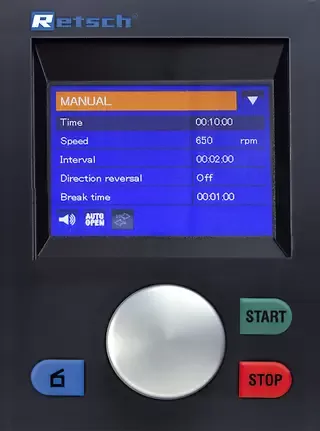
- Batch-wise processing with max. 1 x 220 ml sample
- 2 x 20 ml sample per batch with stacked jars
REPRODUCIBILITY, SAFETY AND EASY HANDLING
- Reproducible results due to speed control
- Easy and safe clamping of grinding jars
- The Safety Slider prevents starting the machine without securely clamped jars
- Perfect stability on the lab bench thanks to FFCS technology
- Innovative counterweight and imbalance sensor for unsupervised operation
- Comfortable parameter setting via display and ergonomic 1-button operation
- Automatic grinding chamber ventilation
- 10 SOPs can be stored, programmable starting time
- Power failure backup ensures storage of remaining processing time
SETTINGS & OPTIONS
- Dry and wet grinding possible
- Suitable for long-term trials, 99 h max.
- Interval operation allows for cooling breaks
- Direction reversal helps to minimize caking effects
WET AND NANO-SCALE GRINDING WITH THE PM 100
Wet grinding is used to obtain particle sizes below 5 µm, as small particles tend to get charged on their surfaces and agglomerate, which makes further grinding in dry mode difficult. By adding a liquid or dispersant the particles can be kept separated.
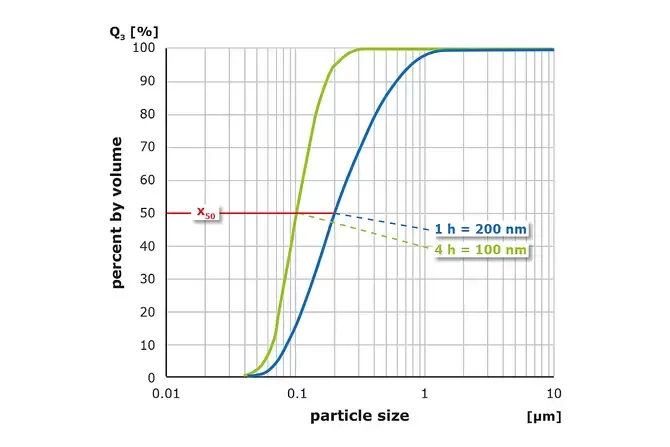
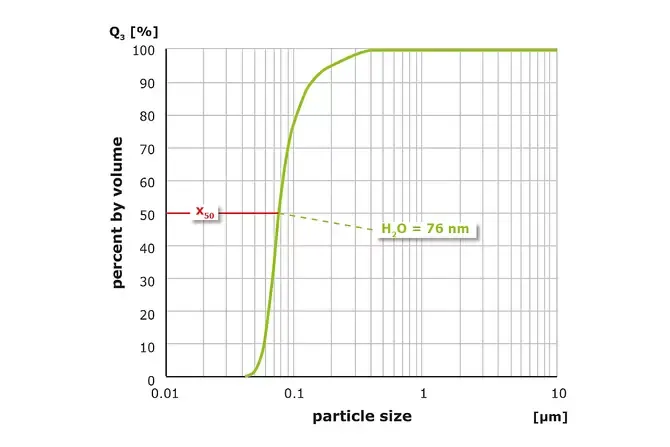
The graphic shows the result of grinding alumina (Al2O3) at 650 rpm in the PM 100. After 1 h of size reduction in water with 1 mm grinding balls, the mean value of the particle size distribution is 200 nm; after 4 h it is 100 nm.м | In another trial, the material was first pulverized for 1 hour with 1 mm grinding balls and then for 3 hours with 0.1 mm grinding balls. In this case, an average size of 76 nm was achieved. |
TYPICAL SAMPLE MATERIALS
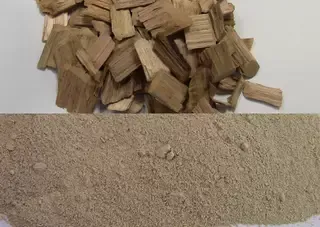
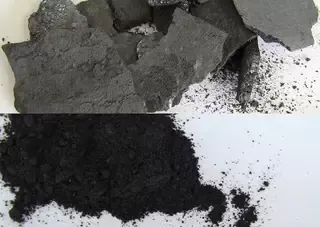
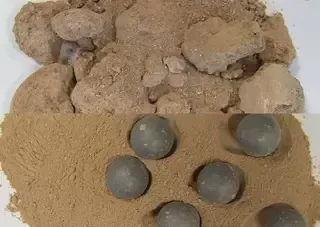

| TOUGH-FIBROUS: WOOD
40 g sample 500 ml stainless steel grinding jar 8 x 30 mm stainless steel grinding balls 5 min at 380 rpm | HARD-BRITTLE: MAGNETITE
315 g sample 250 ml tungsten carbide grinding jar 15 x 20 mm tungsten carbide grinding balls 5 min at 500 rpm | MEDIUM-HARD: SOIL
45 ml sample 125 ml stainless steel grinding jar 7 x 20 mm stainless steel grinding balls 2 min at 400 rpm | FIBROUS: DRIED GRASS
|
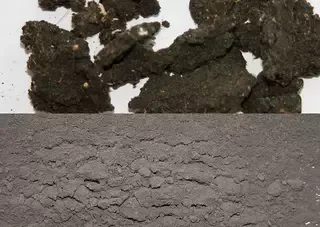
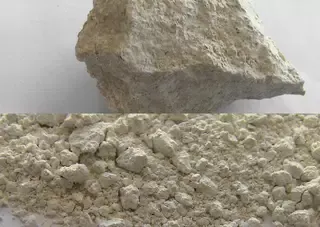
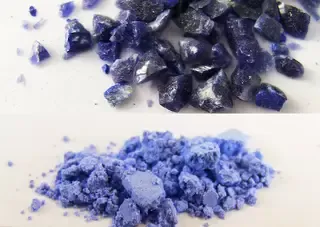
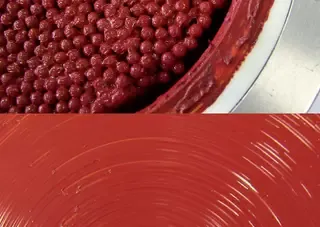
| MEDIUM-HARD/ FIBROUS: SEWAGE SLUDGE 20 g sample 125 ml zirconium oxide grinding jar 50 x 10 mm zirconium oxide grinding balls 30 min at 380 rpm with direction reversal | MEDIUM-HARD: LIMESTONE 170 ml sample 500 ml zirconium oxide grinding jar 8 x 30 mm zirconium oxide grinding balls 3 min at 450 rpm | HARD-BRITTLE: LAPIS LAZULI
4 sample pieces 50 ml zirconium oxide grinding jar 3 x 20 mm zirconium oxide grinding balls 2 min at 420 rpm | SOFT - WET GRINDING: CAROTENE
|
TECHNICAL DATA
| Applications | pulverizing, mixing, homogenizing, colloidal milling, mechanical alloying, mechanosynthesis, nano grinding |
| Field of application | agriculture, biology, chemistry, construction materials, engineering / electronics, environment / recycling, geology / metallurgy, glass / ceramics, medicine / pharmaceuticals |
| Feed material | soft, hard, brittle, fibrous - dry or wet |
| Size reduction principle | impact, friction |
| Material feed size* | < 10 mm |
| Final fineness* | < 1 µm, for colloidal grinding < 0.1 µm |
| Batch size / feed quantity* | max. 1 x 220 ml, max. 2 x 20 ml with stacked grinding jars |
| No. of grinding stations | 1 |
| Speed ratio | 1 : -2 |
| Sun wheel speed | 100 - 650 min-1 |
| Effective sun wheel diameter | 141 mm |
| G-force | 33.3 g |
| Type of grinding jars | EasyFit, optional areation covers, safety closure devices |
| Material of grinding tools | hardened steel, stainless steel, tungsten carbide, agate, sintered aluminum oxide, silicon nitride, zirconium oxide |
| Grinding jar sizes | 12 ml / 25 ml / 50 ml / 80 ml / 125 ml / 250 ml / 500 ml |
| Stackable grinding jars | 12 ml / 25 ml / 50 ml / 80 ml |
| Setting of grinding time | digital, 00:00:01 to 99:59:59 |
| Interval operation | yes, with direction reversal |
| Interval time | 00:00:01 to 99:59:59 |
| Pause time | 00:00:01 to 99:59:59 |
| Storable SOPs | 10 |
| Interface | RS 232 / RS 485 |
| Drive | 3-phase asynchronous motor with frequency converter |
| Drive power | 750 W |
| Electrical supply data | different voltages |
| Power connection | 1-phase |
| Protection code | IP 30 |
| Power consumption | ~ 1250W (VA) |
| W x H x D closed | 640 x 480 (780) x 420 mm |
| Net weight | ~ 86 kg |
| Standards | CE |
| Patent / Utility patent | Counter weight (DE 20307741), FFCS (DE 20310654), SafetySlider (DE 202008008473) |
